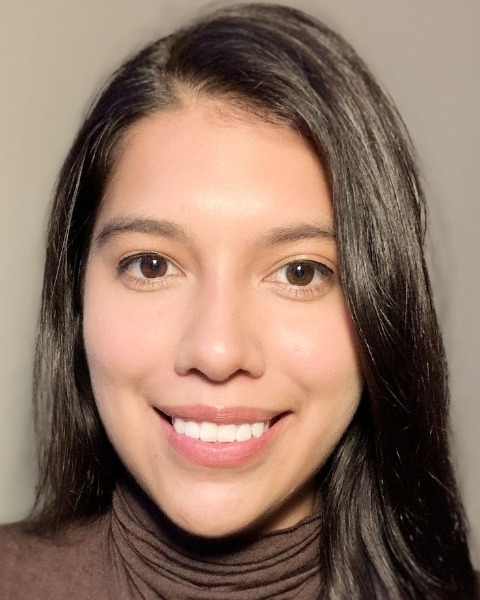Clinical genetic testing
Equity and justice in genetics
Genetic counseling
37- Exploring the Immediate Impact of APOE ε4ε4 Genotype Disclosure among Latinos
Monday, June 10, 2024
5:00 PM - 7:00 PM ET
Location: The Gallery

Daniela Diaz Caro, MS, CGC (she/her/hers)
Research Genetic Counselor
Columbia University, New York, United States
Presenter(s)
Background: Alzheimer’s disease (AD) risk is markedly increased among APOE ε4/ε4 homozygotes. Previous studies of APOE genotype disclosure impact have included few ethnic minorities. This study addresses this gap by investigating the immediate impact of disclosing an APOE ε4/ε4 genotype in the Información de la Enfermedad de Alzheimer para Latinos (IDEAL) study, a Latino community-based study.
Methods: IDEAL participants attended semi-structured genetic counseling sessions conducted via Zoom in Spanish or English by certified genetic counselors. Sessions included a PowerPoint presentation covering genetics, genotype results, risk estimates, and AD prevention methods. Risk estimates were based on data from the Washington Heights-Inwood Columbia Aging Project, a longitudinal study conducted in the same communities. The estimate of risk to age 85 among ε4 homozygotes was 55%. We transcribed session recordings and conducted content analysis.
Results: Eleven ε4/ε4 participants aged 41-64 attended risk evaluation sessions (English 8, Spanish 3). Six had a family history of AD (first-degree 1, distant 5). Nine were women and two men. Overall, participants did not show strong emotional reactions. Many expressed surprise, accompanied by thoughtful reflections on the connection between their AD risk and perceived memory problems or emotional well-being. Participants generally appreciated the information provided during the genetic counseling sessions because it offered insights into the importance of AD risk awareness and prevention strategies.
Conclusion: Latinos at high AD genetic risk showed limited immediate emotional response to risk disclosure and appreciated the information that was shared. Longitudinal analyses may provide further insight into the impacts of this disclosure.
Authors: Daniela Diaz Caro, Gertrude H. Sergievsky Center, Columbia University Irving Medical Center, New York; Sophia Rodriguez, Gertrude H. Sergievsky Center, Columbia University Irving Medical Center, New York, NY; John B. Wetmore, Gertrude H. Sergievsky Center, Columbia University Irving Medical Center, New York,; Jonathan D. Godinez, Gertrude H. Sergievsky Center, Columbia University Irving Medical Center, New York,; Itzel A. Camarillo, Gertrude H. Sergievsky Center, Columbia University Irving Medical Center, New York,; Jill Goldman, Taub Institute, Columbia University Irving Medical Center, New York, NY; Wendy Uhlmann, Division of Genetic Medicine, Department of Internal Medicine and Department of Human Genetics, University of Michigan, Ann Arbor, MI; Sarah McCain, Department of Health Behavior and Health Education, University of Michigan School of Public Health, Ann Arbor, MI; Maria Caban, Department of Sociomedical Sciences, Columbia University Irving Medical Center, New York, NY; Cheng S. Leu, Department of Biostatistics, Columbia University Irving Medical Center, New York, NY; Ana F. Abraído-Lanza, Columbia School of Social Work, New York, NY; Rafael A. Lantigua, Department of Medicine, Columbia University Irving Medical Center, New York, NY; Wendy K. Chung, Department of Pediatrics, Boston Children’s Hospital, Harvard Medical School, Boston, MA; Karolynn Siegel, Department of Sociomedical Sciences, Columbia University Irving Medical Center, New York, NY; Scott Roberts, Department of Health Behavior and Health Education, University of Michigan School of Public Health, Ann Arbor, MI; Ruth Ottman, Gertrude H. Sergievsky Center, Columbia University Irving Medical Center, New York
Methods: IDEAL participants attended semi-structured genetic counseling sessions conducted via Zoom in Spanish or English by certified genetic counselors. Sessions included a PowerPoint presentation covering genetics, genotype results, risk estimates, and AD prevention methods. Risk estimates were based on data from the Washington Heights-Inwood Columbia Aging Project, a longitudinal study conducted in the same communities. The estimate of risk to age 85 among ε4 homozygotes was 55%. We transcribed session recordings and conducted content analysis.
Results: Eleven ε4/ε4 participants aged 41-64 attended risk evaluation sessions (English 8, Spanish 3). Six had a family history of AD (first-degree 1, distant 5). Nine were women and two men. Overall, participants did not show strong emotional reactions. Many expressed surprise, accompanied by thoughtful reflections on the connection between their AD risk and perceived memory problems or emotional well-being. Participants generally appreciated the information provided during the genetic counseling sessions because it offered insights into the importance of AD risk awareness and prevention strategies.
Conclusion: Latinos at high AD genetic risk showed limited immediate emotional response to risk disclosure and appreciated the information that was shared. Longitudinal analyses may provide further insight into the impacts of this disclosure.
Authors: Daniela Diaz Caro, Gertrude H. Sergievsky Center, Columbia University Irving Medical Center, New York; Sophia Rodriguez, Gertrude H. Sergievsky Center, Columbia University Irving Medical Center, New York, NY; John B. Wetmore, Gertrude H. Sergievsky Center, Columbia University Irving Medical Center, New York,; Jonathan D. Godinez, Gertrude H. Sergievsky Center, Columbia University Irving Medical Center, New York,; Itzel A. Camarillo, Gertrude H. Sergievsky Center, Columbia University Irving Medical Center, New York,; Jill Goldman, Taub Institute, Columbia University Irving Medical Center, New York, NY; Wendy Uhlmann, Division of Genetic Medicine, Department of Internal Medicine and Department of Human Genetics, University of Michigan, Ann Arbor, MI; Sarah McCain, Department of Health Behavior and Health Education, University of Michigan School of Public Health, Ann Arbor, MI; Maria Caban, Department of Sociomedical Sciences, Columbia University Irving Medical Center, New York, NY; Cheng S. Leu, Department of Biostatistics, Columbia University Irving Medical Center, New York, NY; Ana F. Abraído-Lanza, Columbia School of Social Work, New York, NY; Rafael A. Lantigua, Department of Medicine, Columbia University Irving Medical Center, New York, NY; Wendy K. Chung, Department of Pediatrics, Boston Children’s Hospital, Harvard Medical School, Boston, MA; Karolynn Siegel, Department of Sociomedical Sciences, Columbia University Irving Medical Center, New York, NY; Scott Roberts, Department of Health Behavior and Health Education, University of Michigan School of Public Health, Ann Arbor, MI; Ruth Ottman, Gertrude H. Sergievsky Center, Columbia University Irving Medical Center, New York